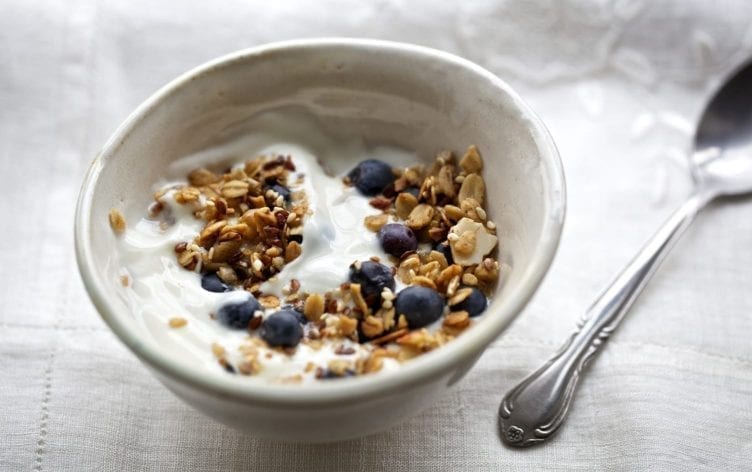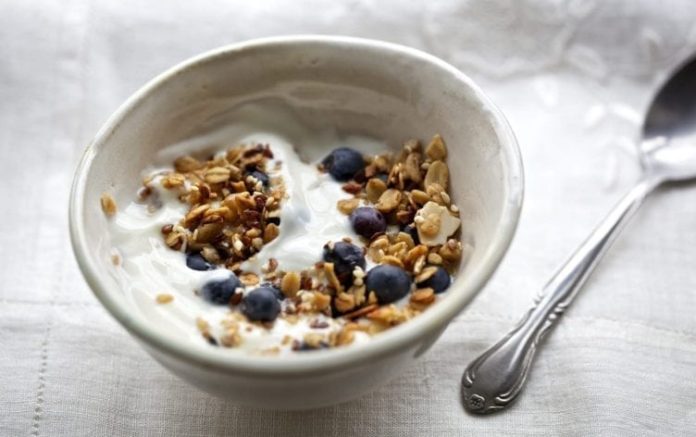
Knowing whether or not you should eat before a workout can be tricky — some believe eating a small bite provides extra energy, while others swear by fasted cardio and want to avoid side effects like digestion problems and muscle cramps.
However, choosing to fuel before a walking workout is highly individual. Stephanie Nelson, a registered dietitian and MyFitnessPal’s in-house nutrition expert shares what you need to know about fueling (or not) before your next walking workout and healthy options to try:
THE CASE FOR EATING BEFORE A WALKING WORKOUT
Eating before a walking workout can be crucial if you’re upping the intensity and duration. For example, if you’re training to walk a marathon, combining your walk with other weightlifting activities, or planning to do interval training to up the speed, your performance could suffer if you don’t have some carbs and protein in your system to fuel the activity.
For those who aren’t quite sure if they’d be better off waiting to eat after their walking workout, Nelson recommends a few simple rules to follow. “If your workout is going to be longer than an hour at a speed greater than three miles per hour, you should consider a pre-workout meal,” she says.
“Another consideration is timing. If your workout falls during your lunch break or at another time when you normally eat, you’ll probably want a snack before your workout and to eat your normal meal afterwards.”
WHAT SHOULD YOU EAT?
Fueling with protein can help prevent muscle damage during intense workouts and studies show consuming carbohydrates can provide more energy to go longer for endurance-based activities like walking.
“Simple carbohydrates are best if you’ll be consuming your meal later,” says Nelson. “For workouts less than an hour, a small snack like a banana, a piece of toast or some oatmeal will do the trick. For workouts longer than an hour, try a smoothie. For an intense or extended workout, you’ll want to have four grams of carbohydrates for every one gram of protein for optimal protein absorption and metabolism.”
To avoid things like stomach cramps, indigestion and other discomfort, make sure you give yourself enough time (at least 45 minutes) to properly digest your food before beginning a high-intensity or long-distance walking workout.
THE CASE FOR EATING AFTER A WALKING WORKOUT
Waiting to eat until after your morning workout might be beneficial if your primary goal is to lose weight. A study conducted on overweight men found those in the group who walked for an hour without eating burned more fat and boosted their metabolism compared to those who had a meal prior to the same workout.
Whether or not this is a strategy you should utilize depends on how your body responds during exercise and the duration of your walk. “This strategy is highly individual, in my experience,” adds Nelson. “If you’re going for an hour or longer, or are doing a difficult hike, you should probably eat, because eventually you’ll need energy from the food. However, for a shorter or moderate intensity walk, it’s more about personal preference.”
Other studies have supported the idea fat loss happens more efficiently in a fasted state. This is partly due to the body having to rely on stored fat as energy instead of carbs and sugars from pre-workout eats.
If fasting pre-workout is a strategy you’re considering, you’ll need to be mindful of overall calorie consumption the day prior. If your body is depleted and your workout calls for higher intensity, your performance could ultimately suffer. “If you’re going for a walk over an hour at a vigorous pace, you’ll have less energy and the walk may feel more difficult than it should,” explains Nelson. Similarly, “if you’re walking in the morning and didn’t eat much the day before, you may experience negative effects,” says Nelson.
For people who find fasting prior to a workout to be beneficial to weight loss, remember to fuel properly post-walk. “Unless you’ve done an intense or extended walk, a small snack or your normal meal is just fine for a post-workout meal,” says Nelson.
THE BOTTOM LINE
If you’re exercising for less than 90 minutes, it may not be necessary to take in additional fuel. However, longer duration and higher intensity exercise requires that added boost. If you do decide to fuel pre-workout, try to find something that agrees with your body and is easy to digest. A few healthy options include Greek yogurt with granola, a piece of toast with nut butter or a small portion of oatmeal topped with sliced bananas.







